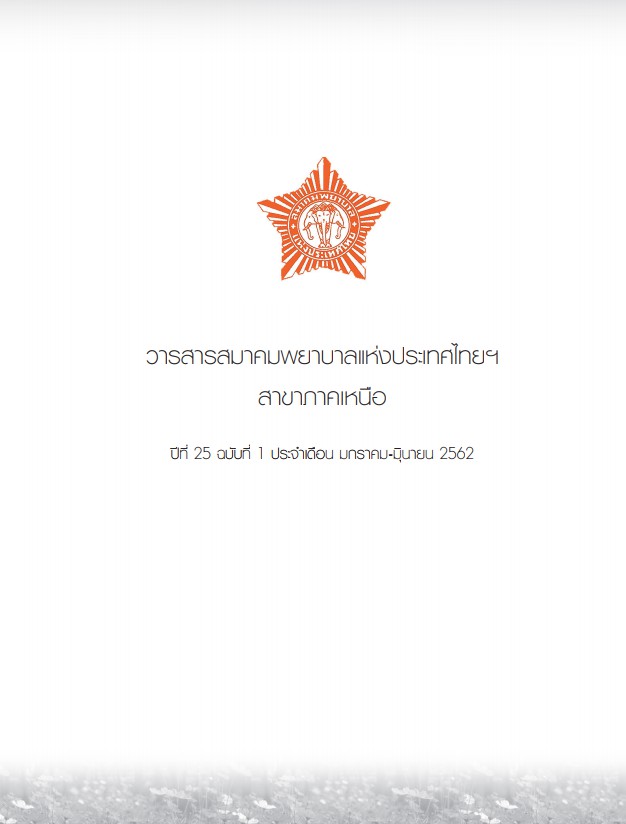ผลของการเรียนรู้โดยใช้ปัญหาเป็นหลักต่อผลลัพธ์การเรียนรู้และความพึงพอใจ ของนิสิตสาธารณสุขศาสตร์ในวิชาการส่งเสริมสุขภาพและการดูแลผู้สูงอายุ
คำสำคัญ:
การเรียนรู้โดยใช้ปัญหาเป็นหลัก, ผลลัพธ์การเรียนรู้, ความพึงพอใจ, นิสิตสาธารณสุขศาสตร์บทคัดย่อ
การวิจัยชั้นเรียนนี้มีวัตถุประสงค์เพื่อศึกษา 1) ผลของการเรียนรู้โดยใช้ปัญหาเป็นหลักต่อผลลัพธ์ การเรียนรู้และความพึงพอใจ และ 2) ความสัมพันธ์ระหว่างผลลัพธ์การเรียนรู้กับความพึงพอใจของ นิสิตสาธารณสุขศาสตร์ในวิชาการส่งเสริมสุขภาพและการดูแลผู้สูงอายุ กลุ่มตัวอย่างได้แก่ นิสิต สาธารณสุขศาสตร์ ชั้นปีที่ 3 จำนวน 45 คน เครื่องมือที่ใช้ ได้แก่ แผนการสอน คู่มือผู้สอน คู่มือผู้เรียน แบบประเมินผลลัพธ์การเรียนรู้ และแบบสอบถามความพึงพอใจ ซึ่งผู้วิจัยสร้างขึ้นเอง โดยผ่านผู้ทรงคุณวุฒิตรวจสอบ 3 ท่าน ได้ค่า CVI เท่ากับ 0.90 และ 0.85 และค่าความเชื่อมั่นซึ่งวัดโดยสัมประสิทธิ์ สหสัมพันธ์ของครอนบาค (Cronbach alpha coefficient) เท่ากับ 0.92 และ 0.94 ตามลำดับ สถิติที่ใช้วิเคราะห์คือ ร้อยละ ค่าเฉลี่ย ส่วนเบี่ยงเบนมาตรฐาน และสหสัมพันธ์ของเพียรสัน ผลการวิจัยพบว่า 1) ผลลัพธ์การเรียนรู้ โดยรวมอยู่ในระดับดี ( =4.44, S.D.=0.35) เมื่อจำแนกรายด้าน พบว่า ด้านความสัมพันธ์ระหว่างบุคคลและความรับผิดชอบอยู่ในระดับมากที่สุด (
=4.56, S.D.=0.59) รองลงมาคือ ด้านคุณธรรมจริยธรรม (
=4.55, S.D.=0.41) ส่วนความพึงพอใจ พบว่า กลุ่มตัวอย่างมีความพึงพอใจในระดับมากที่สุด คือ ส่งเสริมให้ผู้เรียนทำงานร่วมกันเป็นกลุ่ม (
=4.73, S.D.=0.50) รองลงมา คือ ให้อิสระผู้เรียนในการใช้ความคิดและการแสดงออกในการเรียนรู้ (
=4.67, S.D.=0.52) 2) และความสัมพันธ์ระหว่างผลลัพธ์การเรียนรู้กับความพึงพอใจ พบว่า ผลลัพธ์การเรียนรู้มีความสัมพันธ์เชิงบวกกับความพึงพอใจอย่างมีนัยสำคัญทางสถิติที่ระดับ .05 (r=0.711, p≤0.05) จากผลการศึกษาจะเห็นได้ว่า การเรียนรู้โดยใช้ปัญหาเป็นหลักช่วยให้ผู้เรียนมีปฏิสัมพันธ์ ระหว่างบุคคลและมีความรับผิดชอบในการบทบาทหน้าที่ของตนเอง ดังนั้นผู้สอนควรมีการสอดแทรกรูปแบบการเรียนรู้โดยใช้ปัญหาเป็นหลักให้ครอบคลุมทุกรายวิชา เพื่อให้ผู้เรียนเกิดการเรียนรู้ที่มีประสิทธิภาพ
เอกสารอ้างอิง
2. คณะกรรมการประกันคุณภาพการศึกษาภายในระดับอุดมศึกษา. คู่มือการประกันคุณภาพการศึกษาภายในระดับอุดมศึกษา พ.ศ 2557. พิมพ์ครั้งที่ 1. นนทบุรี: ภาพพิมพ์; 2558.
3. สำนักงานคณะกรรมการการอุดมศึกษา. กรอบมาตรฐานคุณวุฒิระดับอุดมศึกษา. กรุงเทพฯ: มปท; 2552.
4. คณะสาธารณสุขศาสตร์ มหาวิทยาลัยเนชั่น. มคอ.2 หลักสูตรสาธารณสุขศาสตรบัณฑิต สาขา สาธารณสุขชุมชน. ลำปาง: มหาวิทยาลัยเนชั่น; 2558.
5. คณาจารย์คณะสาธารณสุขศาสตร์ มหาวิทยาลัยเนชั่น. รายงานความพึงพอใจของนักศึกษาปีสุดท้ายต่อคุณภาพของหลักสูตรสาธารณสุขศาสตรบัณฑิตปีการศึกษา 2560. ลำปาง: มหาวิทยาลัยเนชั่น; 2561.
6. นภาพร พุฒิวณิชย์ สุรศักดิ์ พุฒิวณิชย์ มาริสา สุวรรณราช และอรทัย แก้วมหากาฬ. ผลการจัดการเรียนการสอนโดยใช้ปัญหาเป็นหลักในรายวิชาการพยาบาลบุคคลที่มีปัญหาสุขภาพ 1 ต่อทักษะทางปัญญาของนักศึกษาพยาบาล. วารสารเครือข่ายวิทยาลัยพยาบาลและการสาธารณสุขภาคใต้. 2560;4(1):1-14.
7. เกรียงศักดิ์ พลอยแสง. การศึกษาผลสัมฤทธิ์ทางการเรียนรายวิชาภาษากับการสื่อสารที่จัดการเรียนรู้ แบบใช้ปัญหาเป็นฐาน. รายงานวิจัย. คณะมนุษยศาสตร์ มหาวิทยาลัยมหาจุฬาลงกรณราชวิทยาลัย; 2553.
8. พรเลิศ ชุมชัย สุนทรีย์ คำเพ็ง โยธิน ปอยสูงเนิน. ประสิทธิผลของรูปแบบการจัดการเรียนการสอนโดย ใช้ปัญหาเป็นหลักด้านอาชีวะอนามัยต่อผลสัมฤทธิ์การเรียนรู้ทักษะการแก้ปัญหาการทำงานเป็นทีมและความพึงพอใจของนักศึกษาพยาบาล วิทยาลัยพยาบาลบรมราชชนนี พระพุทธบาท. วารสารการ พยาบาลและการศึกษา. 2559; 9(4):60-73.
9. วัลลี สัตยาศัย. บรรณาธิการ. การเรียนรู้โดยใช้ปัญหาเป็นหลัก: รูปแบบการเรียนรู้โดยใช้ผู้เรียนเป็น ศูนย์กลาง. กรุงเทพฯ:บุ๊คเน็ท; 2547.
10. คณาจารย์วิทยาลัยพยาบาลในสังกัดสถาบันพระบรมราชชนก. คู่มือครูในการจัดการเรียนการสอนโดยใช้ปัญหาเป็นหลัก สำหรับวิทยาลัยพยาบาลในสังกัดพระบรมราชชนก. นนทบุรี: ยุทธรินทร์การพิมพ์; 2558.
11. บุญชม ศรีสะอาด. การวิจัยเบื้องต้น. กรุงเทพฯ: สุวีริยาสาส์น; 2556.
12. สิริวัฒน์ อายุวัฒน์. การเรียนการสอนโดยใช้ปัญหาเป็นหลัก (Problem based learning): ความท้าทายของการศึกษาพยาบาลในการพัฒนาการเรียนรู้ในศตวรรษที่ 21.วารสารพยาบาลกระทรวงสาธารณสุข. 2560; 27(2):15-30.
13. พิชฌาย์วีร์ สินสวัสดิ์ และอรพิน สว่างวัฒนเศรษฐ์. การจัดการเรียนรู้แบบใช้ปัญหาเป็นหลักเพื่อส่งเสริม ความสามารถในการตัดสินใจเชิงจริยธรรมของนักศึกษาพยาบาล. วารสารพยาบาลตำรวจ. 2560; 9(1): 59-71.
14. Kim, Y. J. Observational Application Comparing Problem-Based Learning with the Conventional Teaching Method for Clinical Acupuncture Education. Evidence-Based Complementary & Alternative Medicine (ECAM). 2019; 1–6.
15. Choi, H. A problem-based learning trial on the Internet involving undergraduate nursing students. Journal of Nursing Education. 2003; 42(8): 359–63.
16. Hamdan, A.R, Kwan, C.L, Khan, A., Abdul Ghafar, M.N and Sihes, A.J. Implementation of Problem based learning among Nursing Students. International Education Studies. 2014;7(7):136- 142.
ดาวน์โหลด
เผยแพร่แล้ว
รูปแบบการอ้างอิง
ฉบับ
ประเภทบทความ
สัญญาอนุญาต
บทความที่ได้รับการตีพิมพ์เป็นลิขสิทธิ์ของสมาคมพยาบาลแห่งประเทศไทยฯ สาขาภาคเหนือ
เนื้อหาและข้อคิดเห็นใดๆ ที่ตีพิมพ์ในวารสารสมาคมพยาบาลฯ ถือเป็นความรับผิดชอบของผู้เขียนเท่านั้น ผู้เขียนบทความต้องศึกษารายละเอียดหลักเกณฑ์การจัดทำต้นฉบับตามที่วารสารกำหนด และเนื้อหาส่วนภาษาอังกฤษต้องได้รับการตรวจสอบจากเจ้าของภาษามาแล้ว


